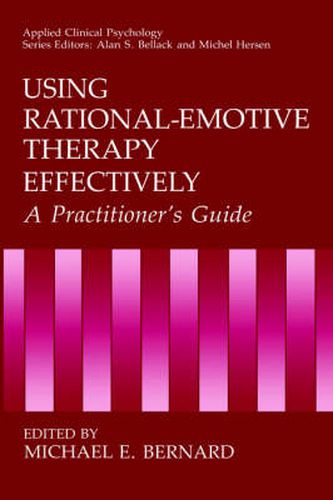Readings Newsletter
Become a Readings Member to make your shopping experience even easier.
Sign in or sign up for free!
You’re not far away from qualifying for FREE standard shipping within Australia
You’ve qualified for FREE standard shipping within Australia
The cart is loading…






This title is printed to order. This book may have been self-published. If so, we cannot guarantee the quality of the content. In the main most books will have gone through the editing process however some may not. We therefore suggest that you be aware of this before ordering this book. If in doubt check either the author or publisher’s details as we are unable to accept any returns unless they are faulty. Please contact us if you have any questions.
The initial conceptualization of this book was much more narrow than the final product that has emerged. I started out believing that it would be enlightening to have a group of acknowledged rational-emotive therapy (RET) expert practitioners with well-established literary credentials write about how they approach the problem of modifying dient irrationality. Many RET practitioners of all levels of experience are, on the one hand, enamored of the economy, the precision, and the accuracy of psychological insight that RET theory offers, but they are, on the other hand, equally frustrated by their own inability to persuade or otherwise change some of the dients they work with more quickly or even at all. Indeed, dients themselves frequently express the view that RET is illuminating, yet they find themselves at the same time puzzled and perplexed by their inability to make the substantial changes that RET invites. It became dearer as I discussed the project with many of the contrib utors that to practice RET effectively requires more than just innovative and persistent assessment and intervention techniques. For example, Rus sell Grieger expressed the view that more prerequisite work needs to be done on the value and philosophical systems of dients-induding person al responsibility and the philosophy of happiness-before many dients can show significant shifts in their thinking. Susan Walen raised the gener al issues of how effective RET can be in the treatment of biologically driven affective disorders.
$9.00 standard shipping within Australia
FREE standard shipping within Australia for orders over $100.00
Express & International shipping calculated at checkout
This title is printed to order. This book may have been self-published. If so, we cannot guarantee the quality of the content. In the main most books will have gone through the editing process however some may not. We therefore suggest that you be aware of this before ordering this book. If in doubt check either the author or publisher’s details as we are unable to accept any returns unless they are faulty. Please contact us if you have any questions.
The initial conceptualization of this book was much more narrow than the final product that has emerged. I started out believing that it would be enlightening to have a group of acknowledged rational-emotive therapy (RET) expert practitioners with well-established literary credentials write about how they approach the problem of modifying dient irrationality. Many RET practitioners of all levels of experience are, on the one hand, enamored of the economy, the precision, and the accuracy of psychological insight that RET theory offers, but they are, on the other hand, equally frustrated by their own inability to persuade or otherwise change some of the dients they work with more quickly or even at all. Indeed, dients themselves frequently express the view that RET is illuminating, yet they find themselves at the same time puzzled and perplexed by their inability to make the substantial changes that RET invites. It became dearer as I discussed the project with many of the contrib utors that to practice RET effectively requires more than just innovative and persistent assessment and intervention techniques. For example, Rus sell Grieger expressed the view that more prerequisite work needs to be done on the value and philosophical systems of dients-induding person al responsibility and the philosophy of happiness-before many dients can show significant shifts in their thinking. Susan Walen raised the gener al issues of how effective RET can be in the treatment of biologically driven affective disorders.